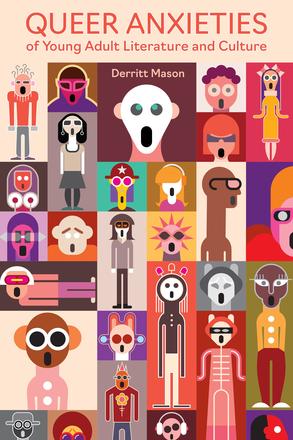
Queer Anxieties of Young Adult Literature and Culture
A new perspective on an explosively popular subgenre of young adult media
Description
Young adult literature featuring LGBTQ+ characters is booming. In the 1980s and 1990s, only a handful of such titles were published every year. Recently, these numbers have soared to over one hundred annual releases. Queer characters are also appearing more frequently in film, on television, and in video games. This explosion of queer representation, however, has prompted new forms of longstanding cultural anxieties about adolescent sexuality. What makes for a good “coming out” story? Will increased queer representation in young people’s media teach adolescents the right lessons and help queer teens live better, happier lives? What if these stories harm young people instead of helping them?
In Queer Anxieties of Young Adult Literature and Culture, Derritt Mason considers these questions through a range of popular media, including an assortment of young adult books; Caper in the Castro, the first-ever queer video game; online fan communities; and popular television series Glee and Big Mouth. Mason argues themes that generate the most anxiety about adolescent culture—queer visibility, risk taking, HIV/AIDS, dystopia and horror, and the promise that “It Gets Better” and the threat that it might not—challenge us to rethink how we read and engage with young people’s media. Instead of imagining queer young adult literature as a subgenre defined by its visibly queer characters, Mason proposes that we see “queer YA” as a body of transmedia texts with blurry boundaries, one that coheres around affect—specifically, anxiety—instead of content.
Reviews
"Mason’s queer reading strategies and his queer readings of YA cultural texts can help us imagine ourselves differently, our relationships differently, and our world differently. . . . His engagement with theory is nuanced and smart, his provocations clear and compelling. I find the focus on anxiety promising, provocative, generative even."
- Jennifer Miller, Children's Literature
"Queer Anxieties of Young Adult Literature and Culture is an outstanding book that will help direct conversations around queerness in YA culture for some time to come. In valuing the blurriness of affect over content when defining queer YA, Derritt Mason brilliantly acknowledges alternative ways of locating queerness and invites readers to think about how definition participates in a larger affective history. The field of children’s and young adult literature is incredibly lucky to have Mason as one of our scholars."
- Katharine Slater, associate professor at Rowan University
"Nevertheless, Queer Anxieties of Young Adult Literature and Culture is successful in its aims, which is to demonstrate how queer young people modulate desires and anxieties surrounding their adolescence, and how adult anxieties persist in YA literature, from older texts to contemporary multimedia projects. In doing so, the book enriches critical conversations about YA literature and queer theory, laying the groundwork for future discussions of cultural anxieties about adolescent sexuality."
- Yuwen Zhang, IRCL
"Queer Anxieties of Young Adult Literature and Culture is an important contribution to children’s and YA literature."
- C. McCutcheon, CHOICE
"I admire very much Mason’s re-readings of older queer YA. And his overarching point about critics’ (i.e. our) anxious investment in YA cannot be overstated."
- Jonathan Alexander, Children's Literature Association Quarterly
"Queer Anxieties in Young Adult Literature and Culture has the potential to shift the focus in multiple fields and disciplines away from strict definitions and a linear trajectory of ‘bad’ representation to ‘good’ representation. Mason’s thoughtful, in-depth, and provocative arguments will give educators, scholars, librarians, and YA critics in general much to consider and apply to future research in the field, as well as to the broader field of cultural studies."
- Robert Bittner, International Journal of Young Adult Literature